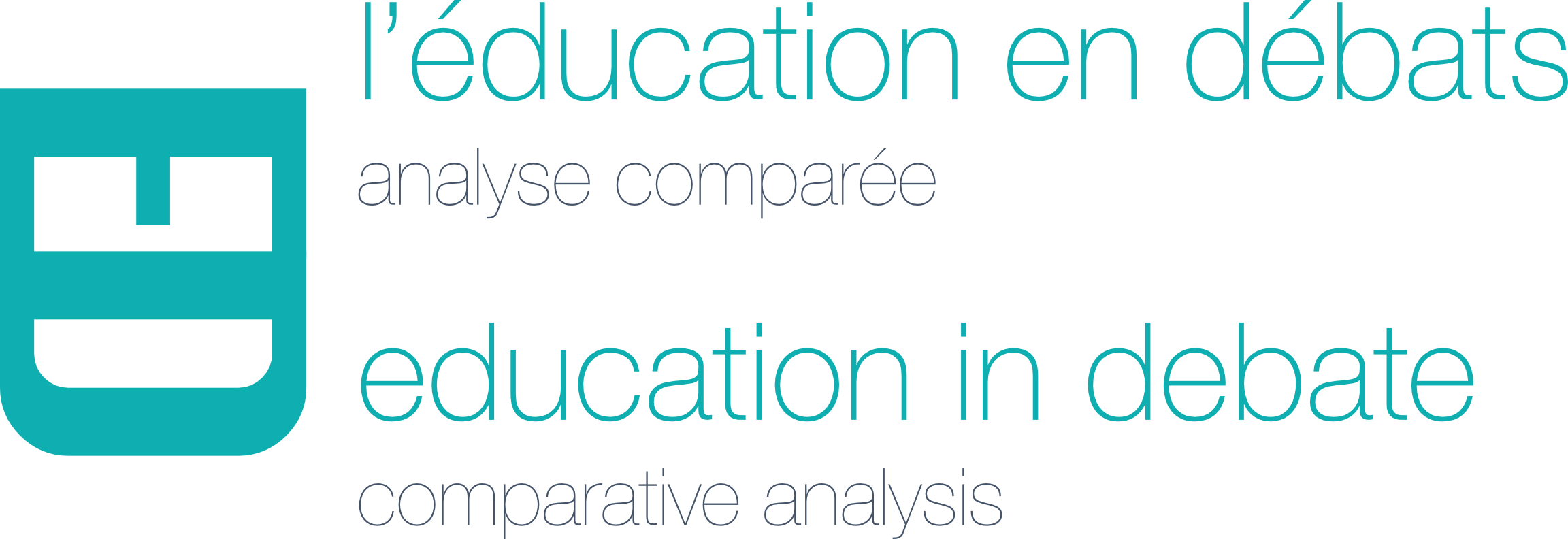Globalization and Schooling: Equity and Access Issues
Résumé
-
Références
Arnove, R., &Torres, C. (1999). Comparative Education: The Dialectic of the Globaland the Local. Lanham, Maryland: Rowman and Littlefield.
Barber, M. (2000). The Evidence of Things not Seen: Reconceptualising Public Education. Paper presented to the OECD Schooling for Tomorrow Conference, 3 November, Rotterdam.
Bourdieu, P. (1986). The Forms of Capital. In J. G. Richardson (Ed.), Handbookof Theoryand Research for the Sociologyof Education (pp. 241258). New York: Greenwood Press.
Bourdieu, P., & Passeron, J.C. (1977). Reproduction in Education, Society and Culture. London: Sage.
Burbules, N., & Torres, C. (2000). Globalization and Education: Critical Perspectives. New York:Routledge.
Carnoy, M. (1999). Globalization and Educational Reform: What Planners Need to Know. Paris:
UNESCO, International Institute for Education Planning.
Coleman, J. (1975). What is Meant by ‘an Equal Educational Opportunity’? Oxford Reviewof Education, 1,27.
Coombs, P. (1982). Critical World Educational Issues of the Next Two Decades. International Reviewof Education, 28(1), 143158.
Conachy, M. (1999). Social inequalityand poverty increasing worldwide. http://www.wsws.org/articles/1999/aug1999/una06_prn.shtml, accessed 21 October, 2007.
Cowen, R. (Ed.) (1996). Comparative Edcuation and PostModernity. Comparative Education, 32(2). Daun, H. (2005). Globalisation and the Governance of National Education Systems. In J. Zajda (Ed.), International Handbookof Globalisation and Education Policy Research (pp. 93107). Dordrecht: Springer.
Delanty, G. (2001). Challenging Knowledge: The University in the Knowledge Society. Buckingham: The Society for Research into Higher Education & Open University Press.
Dervis, K. (2007). Inclusive Globalization. In United Nations Development Programme Annual Report Making Globalization Workfor All. New York: Unesco.
Dorius, S. (2006). Rates, shares, gaps and ginis: are women catching up with men worldwide. Draft report. Pennsylvania State University.
Giddens, A. (1990). The Consequences of Modernity. Stanford: Stanford University Press.
Giddens, A. (2000). Runaway World: HowGlobalization is Reshaping our Lives. New York:Routledge King, E. (2005). Social Class and Children’s Lives. In J. Zajda (Ed.). Education and Society(pp. 7183). Melbourne: James Nicholas Publishers.
Milanovic, B. (1999). True world income distribution, 1988 and 1993 first calculations, based on household surveys alone. Policy Research Working Paper Series, 2244, New York: The World Bank. Milanovic, B. (2002). True world income distribution, 1988 and 1993: First calculation based on household surveys alone, Economic Journal, 112(476), 5192.
Nisbet, R. (1971). The Degradation of the Academic Dogma. London: Heinemann.
OECD, (2007). Education at a Glance. OECD Indicators. Paris: OECD.
OECD, (2006). Education Policy Analysis: Focus on Higher Education. Paris: OECD.
OECD, (2001). Education at a Glance. OECD Indicators. Paris: OECD.
OECD, (2001). Education Policy Analysis. Paris: OECD.
PISA (2006). Science Competencies for Tomorrow’s World. Volume I: Analysis. Paris: OECD. http://www.oecd.org/dataoecd/15/13/39725224.pdf, accessed 12 January, 2008.
Polesel, J. (2005). Gender, Ethnicity and Mathematics: The Experience of Greek Girls in an Australian High School. In J. Zajda (Ed.). Education and society (pp. 7183). Melbourne: James Nicholas Publishers. Rikowski, G. (2000). Education and Social Justice within the Social Universe of Capital. Paper presented at the BERA day seminar on "Approaching Social Justice in Education: Theoretical Frameworks for Practical Purposes", Faculty of Education, Nottingham Trent University, 10th April
Robertson, S., Bonal, X., & Dale, R. (2002). GATS and the Education Service Industry: The Politics of Scale and Global Reterritorialisation. Comparative Education Review, 43(3), 472496.
Rust, V. at al. (2003). Theory in Comparative Education. World Studies in Education, 4(1), 527.
Soudien, C., and Kallaway, P. (1999). Education, Equity and Transformation. Dordrecht: Kluwer Academic Publishers.
Teese, R. and Polesel, J. (2003). Undemocratic Schooling: Equity & Quality in Mass Secondary Education in Australia. Melbourne: Melbourne University Press.
The State of the World’s Children (2008). New York: UNICEF.
United Nations Human Development Report (1999). New York: Oxford University Press. http://hdr.undp.org/en/media/hdr_1999_front.pdf
United Nations Development Programme Annual Report (2007). Making Globalization Workfor All. New York: Unesco.
Waters, M. (1995). Globalization. London: Routledge.
Zajda, J. (2005). The International Handbookof Globalisation and Education PolicyResearch. Dordrecht: Springer.
Zajda, J. Majhanovich, S. and Rust, V. (2006) (Eds.) Education and Social Justice. Dordrecht: Springer.
Zajda, J. & Zajda, R. (2007). Marketing School quality and Effectiveness in a Global Culture. In J. Zajda, (Ed.). Education and Society (3rd edition) (pp. 97108). Melbourne: James Nicholas Publishers.
Zajda, J., Biraimah, B., & Gaudelli, W. (2008). (Eds.). Education and Social Inequalityin the Global Culture. Dordrecht: Springer.
Zajda, J. (2009). Globalisation, and Comparative Research: Implications for Education. In J. Zajda & V. Rust (ed.), Globalisation, Policyand Comparative Research: Discourses of Globalisation (pp. 112).Dordrecht: Springer.
Téléchargements
Publiée
Comment citer
Numéro
Rubrique
Licence
Certains droits réservés 2010 The Author(s)

Ce travail est disponible sous licence Creative Commons Attribution - Pas d'Utilisation Commerciale - Pas de Modification 4.0 International.





